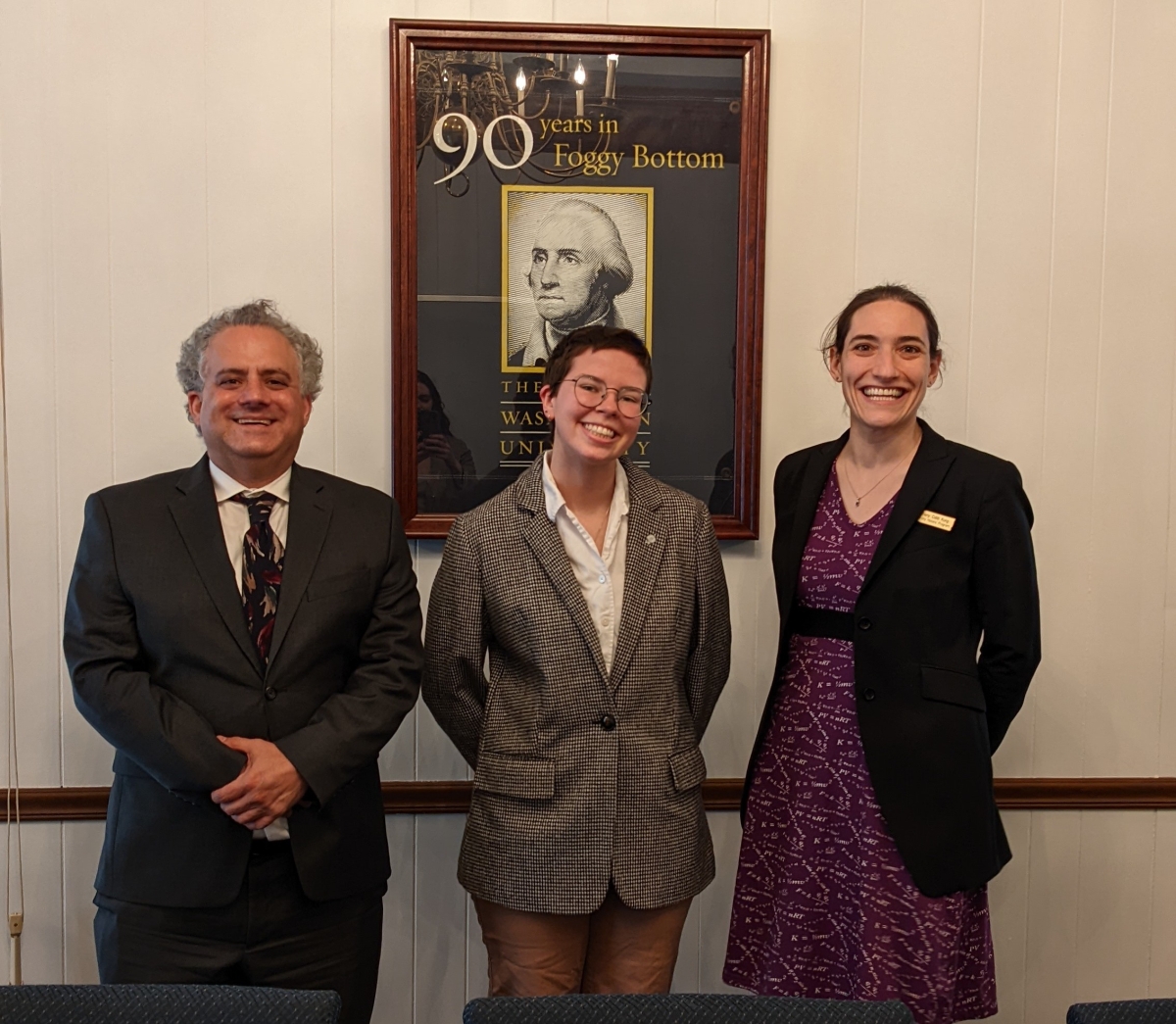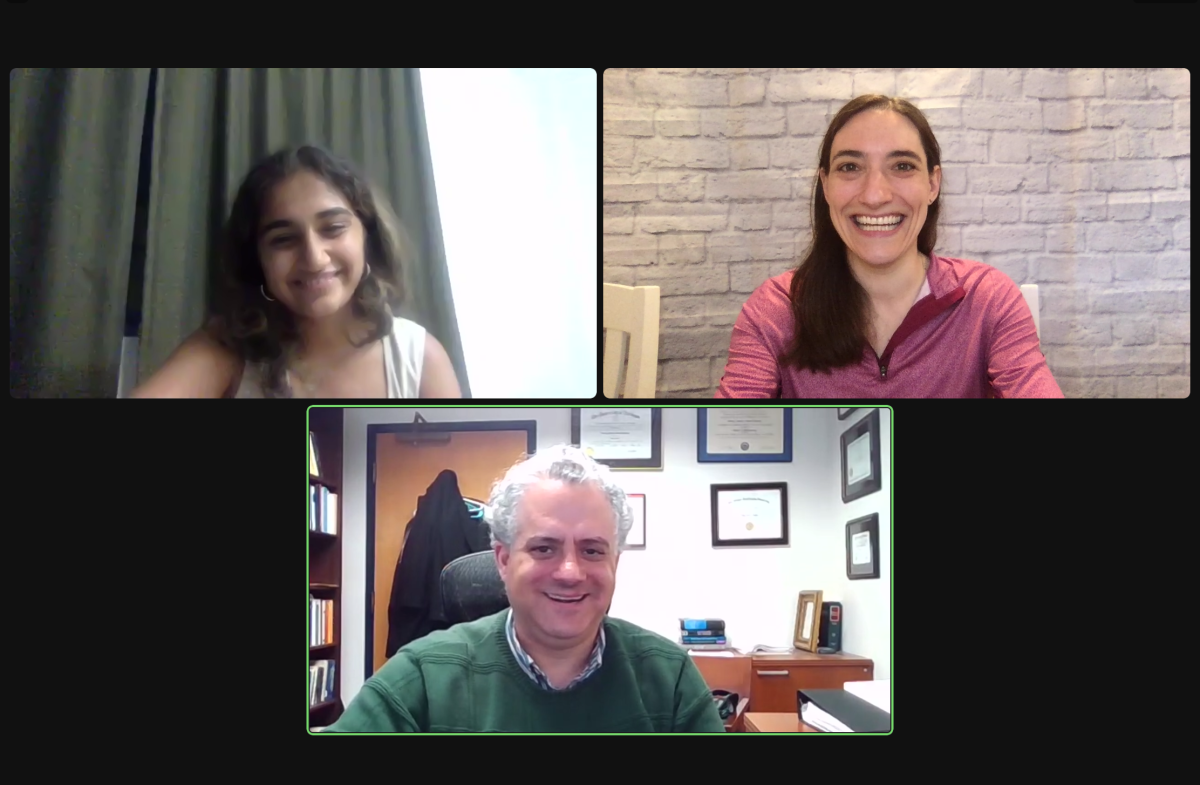Congratulations to our Phi Beta Kappa Essay Contest Winners!
First Prize: Julia Kerrigan (CCAS, 2023)
Julia with PBK Faculty Members Jeff Brand and Bethany Cobb Kung:

Essay prompt: "What's an insight you gained outside of GW (maybe through service learning, an internship, or a research project) that you brought into your academic work at GW?"
E.M. Forster’s epigraph “only connect” gets thrown around the world of liberal arts education like a worn-out textbook, rented repeatedly until it’s battered and dogeared. I had never felt its meaning more keenly than that hot summer day in Eastern Pennsylvania, when a camper asked to talk after lunch. First, I ran through the protocol in my head. Blast a sign-off over the walkie-talkie. Go sit somewhere in general view. Listen intently, and whatever you do, don’t interrupt. While that last step was important for any child, it held far more weight at this camp. It was typical in its activities—archery, swimming, crafts. Its uniqueness lay in the campers, all children who stutter. In fact, most of the staff did, too.
We settled into two Adirondack chairs in front of the calm lake, a picturesque location for what was likely about to be a difficult conversation. “I wanted to talk to a queer woman,” he said, “because I think I am one, and my name is Eliza*.” And suddenly, I could see my camper for who they were. Who she was, Eliza. This swell of pride came first, and next, the uncertainty of what to say. I was educated in stuttering, in staff protocol, in transgender history and gender theory. To connect my own identity as a lesbian to this knowledge base was unthinkable.
Only connect had always meant article to article, case-study to textbook, novel to play. And yet there we sat in the chairs, and she was sitting directly in front of me, existing at the intersection of a communication disorder and gender dysphoria. “I am so honored you told me,” I managed to whisper out in a voice strained with pride and emotion. “And it’s nice to meet you again, Eliza.” She grinned.
When I had first heard about the camp for youth who stutter within the drone of an online lecture, I knew I was meant to be there. My love for speech pathology runs deep, but I can never get past the underlying message of needing to “fix” clients. There, campers don’t attend a single second of speech therapy. They stutter in their cabins, at mess hall tables, even over the booming of microphones. No one attempts to fix them, because they aren’t broken. The same applies for their sexualities, shifting gender identities, and all matters of expression. I made sure Eliza knew this much. That she wasn’t broken in her speech or her gender.
There were logistical matters to attend to, like informing her bunk counselors of her name and pronouns, but for that moment I basked in the opportunity to sit and listen to queer youth. To hear her story wholly and provide what advice or affirmation I could. What Eliza entrusted me with that day goes beyond any knowledge I could find in a textbook. It has never been taught in a lecture hall, and never will be. The experience of connection remains there, on those Adirondack chairs, in front of the gleaming lake.
*The camper’s name has been changed for their privacy.
Second Prize: Aditi Rao (GWSB, 2023)
Aditi with PBK Faculty Members Jeff Brand and Bethany Cobb Kung:

“What has been the most impactful class you have taken in college thus far?” This is a question I am often asked in an interview setting. As an undergraduate business student, it may seem odd that I consistently answer, “I took a philosophy class through the university honors program and I truly believe it has had the most profound impact on me, personally and professionally.” While my business coursework instills hard skills which will be useful as I enter the working world, my courses in liberal arts constantly push my intellectual boundaries and create usefulness in unexpected ways. I greatly attribute my ability to think critically and analyze situations to the complex readings of my honors classes. These are the very skills that leaders across disciplines carry throughout their work. However, beyond the importance of being “employable” in the competitive working world, my liberal arts courses give me the space to ask questions about my own human experience and the kind of contribution I want to leave.
In today’s academic climate, there are seldom opportunities for students to question the ways of the world. We are taught to study the presented materials and reproduce the information in a multiple-choice or free-response format. This paves the way for a mindset of numeric validation through a 4.0 scale, rather than true intellectual growth. My liberal arts courses and professors differ greatly in scholastic mindset. I have taken several courses in varying academic disciplines including philosophy, history, and political science. Each of these experiences has taught me to look at the world from a new lens and think critically about the human experience. More surprisingly, they have also taught me to put a lens on myself and evaluate my own thinking and experiences. Not often are students given the space for self-reflection in the classroom. As the next generation of doctors, CEOs, and policy-makers, I believe it is critical to have a space for reflection as our decisions will have greater implications in the future.
I have found my education in the liberal arts to encourage a deep level of introspection and instill greater empathy within me. The process of learning about society through different lenses creates a greater understanding of the human condition. Whether it be the teachings of Buddha’s Dhammapada or learning the impact Eleanor Roosevelt had on global affairs, I have gained insight into multiple facets of society. The experiences of a particular group within history may resonate with another’s. More simply, I have found that though people are influenced by the era, culture, and location within which they reside, all humans are fundamentally the same. This notion has been empowering in my daily interpersonal relations. Knowing that by and large all humans are motivated and energized by the same things can create more meaningful relationships with others who may seem “different” at first. The lessons I have learned through my liberal arts coursework will continue to have an impact on me, far beyond my collegiate career.

